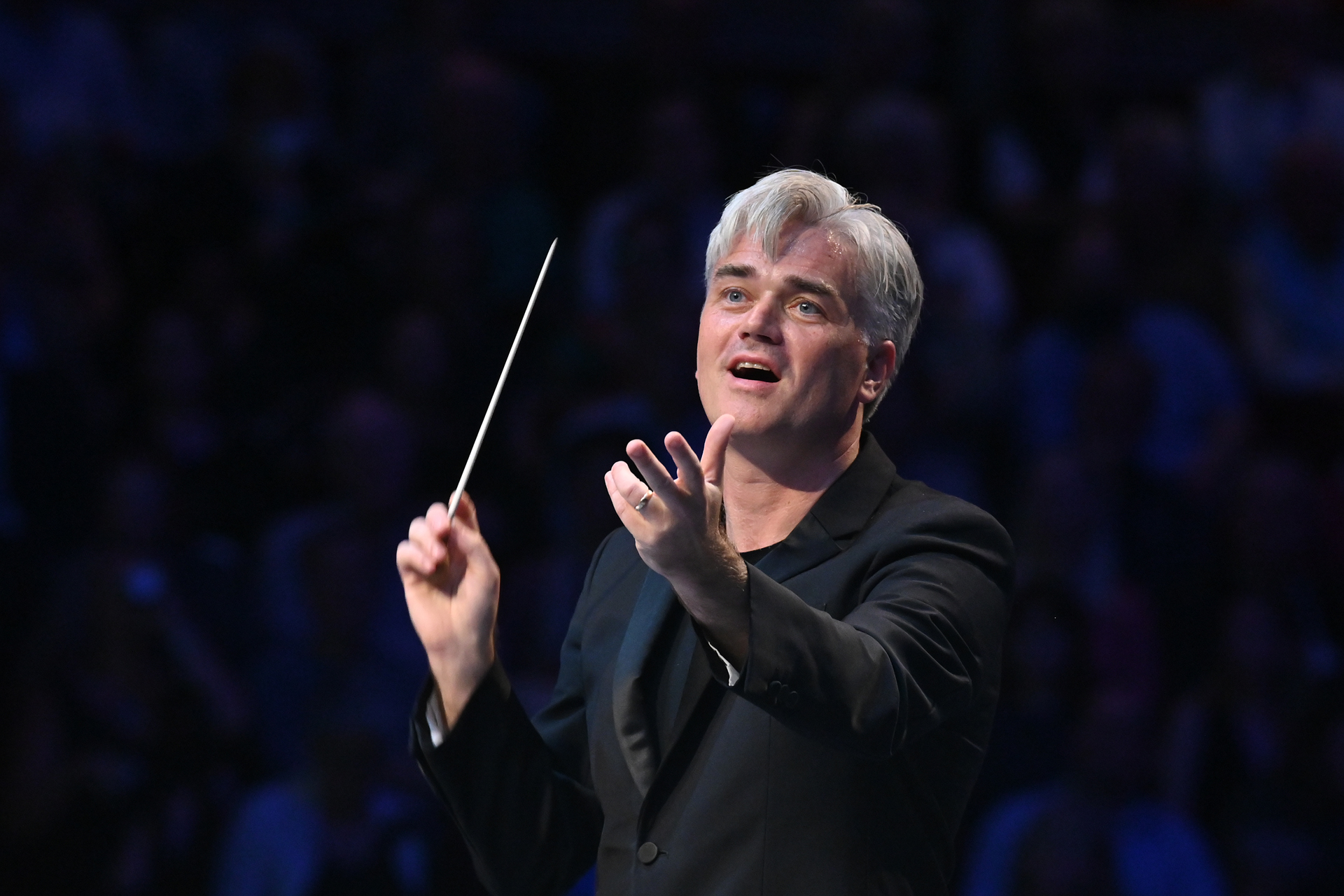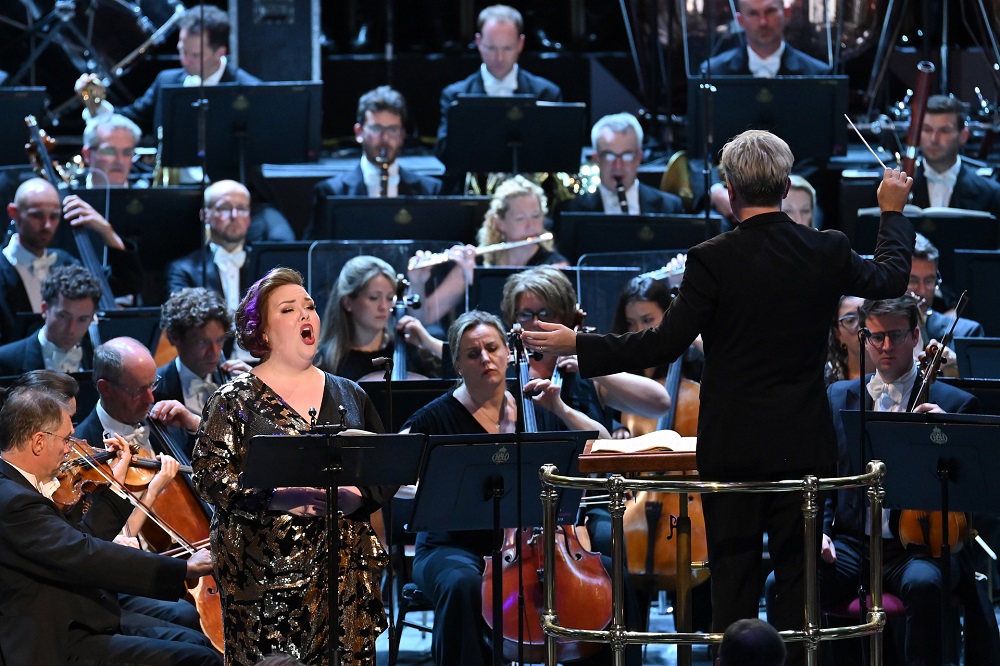Prom 59, The Dream of Gerontius, Clayton, Barton, Platt, LPO, Gardner review - most sure in all its ways | reviews, news & interviews
Prom 59, The Dream of Gerontius, Clayton, Barton, Platt, LPO, Gardner review - most sure in all its ways
Prom 59, The Dream of Gerontius, Clayton, Barton, Platt, LPO, Gardner review - most sure in all its ways
Elgar’s time-become-space odyssey floats and soars in the perfect venue
Asked which work suits capricious Albert Hall acoustics best, I’d say Elgar’s The Dream of Gerontius, partly due to the choral billows – this year there’s been an extra thrill about massed choirs – but also because the Kensington colosseum haloes this spiritual journey of a soul. Best singer in the space? Based on years of Proms experience, surely the palm should go to tenor Allan Clayton, ringing of tone and so clear in diction that you can hear every word.
So the work and the protagonist were assured before a note had been played. What really allowed everything to take flight, though, were Edward Gardner’s sure footed pacing and projection of detail. Shortly beginning his second season as principal conductor of the London Philharmonic Orchestra at home in the Royal Festival Hall, Gardner (pictured below) passed the first-year test with flying colours in everything from the ebb and flow of late romantic masterpieces like this to the sharp-etched radiance of Tippett’s The Midsummer Marriage and a daunting programme of new or very recent works. The Proms venue presented special challenges, not least the temptation to wallow. 
Pitch in the middle range seemed a bit of a problem at times for Jamie Barton (pictured below), ever so slightly under the note as the Angel glides in (the ineffable, weightless string reverie before it, though, could not have been more supernatural). But her thrilling high notes – she took the optional top A in the climactic “Alleluia” – and superb chest voice combined with ideal commitment. I’ll listen again on the radio, because I fancy that hearing her from a position where she was angled slightly away from us may have diminished the live experience. 
James Platt’s Priest and Parsifalian Angel of the Agony had equal authority; what a difference it makes to have a true bass, and not just a bass-baritone, in these roles. Was it my fault if I hit the earth a bit in what should be the levitational (other) Angel’s farewell? Gardner got the right mystic colours, but for once the end didn’t quite crown the work for me. I’ll listen again on Radio 3, but I’d already had my visions. And what a Proms year it's been, as planned, for the big masterpieces featuring big choirs, with Beethoven's Ninth and his Missa Solemnis still to come.
rating
Explore topics
Share this article
The future of Arts Journalism
You can stop theartsdesk.com closing!
We urgently need financing to survive. Our fundraising drive has thus far raised £49,000 but we need to reach £100,000 or we will be forced to close. Please contribute here: https://gofund.me/c3f6033d
And if you can forward this information to anyone who might assist, we’d be grateful.

Subscribe to theartsdesk.com
Thank you for continuing to read our work on theartsdesk.com. For unlimited access to every article in its entirety, including our archive of more than 15,000 pieces, we're asking for £5 per month or £40 per year. We feel it's a very good deal, and hope you do too.
To take a subscription now simply click here.
And if you're looking for that extra gift for a friend or family member, why not treat them to a theartsdesk.com gift subscription?
more Classical music
 BBC Proms: The Marriage of Figaro, Glyndebourne Festival review - merriment and menace
Strong Proms transfer for a robust and affecting show
BBC Proms: The Marriage of Figaro, Glyndebourne Festival review - merriment and menace
Strong Proms transfer for a robust and affecting show
 BBC Proms: Faust, Gewandhausorchester Leipzig, Nelsons review - grace, then grandeur
A great fiddler lightens a dense orchestral palette
BBC Proms: Faust, Gewandhausorchester Leipzig, Nelsons review - grace, then grandeur
A great fiddler lightens a dense orchestral palette
 BBC Proms: Jansen, Royal Concertgebouw Orchestra, Mäkelä review - confirming a phenomenon
Second Prom of a great orchestra and chief conductor in waiting never puts a foot wrong
BBC Proms: Jansen, Royal Concertgebouw Orchestra, Mäkelä review - confirming a phenomenon
Second Prom of a great orchestra and chief conductor in waiting never puts a foot wrong
 BBC Proms: Royal Concertgebouw Orchestra, Mäkelä review - defiantly introverted Mahler 5 gives food for thought
Chief Conductor in Waiting has supple, nuanced chemistry with a great orchestra
BBC Proms: Royal Concertgebouw Orchestra, Mäkelä review - defiantly introverted Mahler 5 gives food for thought
Chief Conductor in Waiting has supple, nuanced chemistry with a great orchestra
 Dunedin Consort, Butt / D’Angelo, Muñoz, Edinburgh International Festival 2025 review - tedious Handel, directionless song recital
Ho-hum 'comic' cantata, and a song recital needing more than a beautiful voice
Dunedin Consort, Butt / D’Angelo, Muñoz, Edinburgh International Festival 2025 review - tedious Handel, directionless song recital
Ho-hum 'comic' cantata, and a song recital needing more than a beautiful voice
 Classical CDs: Dungeons, microtones and psychic distress
This year's big anniversary celebrated with a pair of boxes, plus clarinets, pianos and sacred music
Classical CDs: Dungeons, microtones and psychic distress
This year's big anniversary celebrated with a pair of boxes, plus clarinets, pianos and sacred music
 BBC Proms: Liu, Philharmonia, Rouvali review - fine-tuned Tchaikovsky epic
Sounds perfectly finessed in a colourful cornucopia
BBC Proms: Liu, Philharmonia, Rouvali review - fine-tuned Tchaikovsky epic
Sounds perfectly finessed in a colourful cornucopia
 BBC Proms: Suor Angelica, LSO, Pappano review - earthly passion, heavenly grief
A Sister to remember blesses Puccini's convent tragedy
BBC Proms: Suor Angelica, LSO, Pappano review - earthly passion, heavenly grief
A Sister to remember blesses Puccini's convent tragedy
 BBC Proms: A Mass of Life, BBCSO, Elder review - a subtle guide to Delius's Nietzschean masterpiece
Mark Elder held back from blasting the audience with a wall of sound
BBC Proms: A Mass of Life, BBCSO, Elder review - a subtle guide to Delius's Nietzschean masterpiece
Mark Elder held back from blasting the audience with a wall of sound
 BBC Proms: Le Concert Spirituel, Niquet review - super-sized polyphonic rarities
Monumental works don't quite make for monumental sounds in the Royal Albert Hall
BBC Proms: Le Concert Spirituel, Niquet review - super-sized polyphonic rarities
Monumental works don't quite make for monumental sounds in the Royal Albert Hall
 Frang, Romaniw, Liverman, LSO, Pappano, Edinburgh International Festival 2025 review - sunlight, salt spray, Sea Symphony
Full force of the midday sea in the Usher Hall, thanks to the best captain at the helm
Frang, Romaniw, Liverman, LSO, Pappano, Edinburgh International Festival 2025 review - sunlight, salt spray, Sea Symphony
Full force of the midday sea in the Usher Hall, thanks to the best captain at the helm
 Elschenbroich, Grynyuk / Fibonacci Quartet, Edinburgh International Festival 2025 review - mahogany Brahms and explosive Janáček
String partnerships demonstrate brilliant listening as well as first rate playing
Elschenbroich, Grynyuk / Fibonacci Quartet, Edinburgh International Festival 2025 review - mahogany Brahms and explosive Janáček
String partnerships demonstrate brilliant listening as well as first rate playing

Add comment